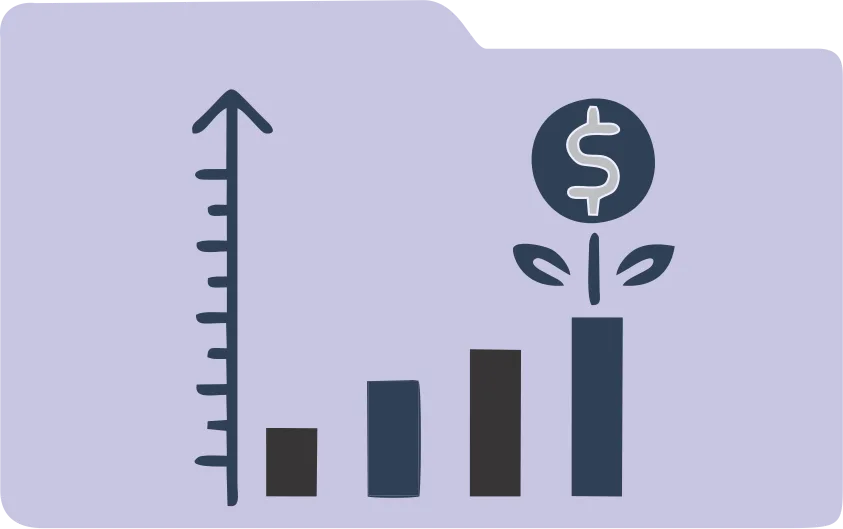Types of investment accounts, what are they and what is each one used for?
Investing in the stock market can be a great way to increase your wealth, but it’s important to understand the different types of brokerage accounts available to get the most out of your investments.
Brokerage accounts are important to any investor, as they allow them to buy and sell stocks, bonds, mutual funds, and other securities. Here’s a brief overview of the types of brokerage accounts available and how they can help you maximize your investments.
An investment or brokerage account is a financial instrument that basically allows you to buy and/or sell securities on the stock market. The most common and simple type of brokerage account is the traditional or basic brokerage account which allows you to buy and sell investments without incurring taxes until you withdraw your money.
In the market you will find different types of accounts, although they all basically work for the same thing, they have different purposes and depending on the broker you find you can find different alternatives, here we will show you the most common ones so you know which one is best for you, remember, Regardless of the type of brokerage account you decide to use, it is important to do your research and understand the associated risks and costs before investing. Doing so can help you maximize your investments and create a plan for long-term success.
These are the common types of investment accounts offered by brokers
1 Individual Brokerage Accounts – These are personal investment accounts that allow individuals to buy and sell securities, such as stocks, bonds, and mutual funds.
2 Managed Brokerage Account: A type of investment account that a financial adviser manages on behalf of the investor. The financial advisor takes into account the investor’s objectives, risk tolerance and other factors to create a customized investment portfolio. The advisor will then monitor and adjust the portfolio as necessary to ensure it is aligned with the investor’s objectives.
3 Retirement Accounts – These are tax-advantaged investment accounts designed specifically to help you save for retirement. Examples include traditional and Roth IRAs, 401(k) plans, and SEP IRAs.
4 Joint Brokerage Accounts: These are investment accounts owned by more than one person, usually spouses or partners.
5 Custodial Brokerage account: is a financial tool that allows parents or guardians to give minors, such as their children, money or assets to invest. Such accounts can help parents teach children how to save money and invest for the future. The most popular custodial account is UGMA
6 Trust accounts: These are investment accounts created for the benefit of a third party, such as spouses or children, and are managed by a trustee.
7 Taxable Brokerage Accounts: These are investment accounts that are subject to federal and state income taxes, capital gains taxes, and other taxes on investment income.
Each type of investment account has its own set of rules and tax implications, so it’s important to understand them before choosing one. The type of investment account you choose will depend on your goals, risk tolerance, and tax situation. A financial adviser or tax professional can help you determine which type of account is best for you.
How to use each account
Self-directed brokerage accounts
This type of account facilitates own investment. This type of brokerage account allows you to manage your own investments without the help of a financial advisor or broker.
While self-directed brokerage accounts do carry a level of risk, they also offer the potential for higher returns and more control over your investments. Self-directed brokerage accounts are ideal for anyone who understands the markets and wants to make their own investment decisions.
With these accounts, you can access a variety of different stocks, mutual funds, exchange-traded funds (ETFs), and even cryptocurrencies. You can set up your account and choose from a range of different asset classes, with the ability to buy and sell investments as you wish.
With self-directed brokerage accounts, you have full control over the investments you make and how you manage them. This makes it easier to diversify your portfolio, watch the markets, and make timely decisions about when to buy and sell. You also have the flexibility to change your investment strategy if market conditions change.
Another great benefit of self-directed brokerage accounts is that they often have lower costs and fees than traditional managed accounts. Since you are the decision maker, you usually don’t have to pay advice fees or commissions to brokers.
Some brokers offer this type of account with margin and without margin, as well as you can also find individual account types with the option to buy fractional shares, which makes it easier for new investors or those with low capital, access to investment accounts.
What is a margin broker account
A margin broker account is an account held by a financial institution that gives a borrower the ability to borrow money from the financial institution and use the borrowed money to purchase certain financial instruments, such as stocks and bonds. The borrower agrees to pay the lender a fixed rate of interest on the borrowed funds, and is also responsible for any losses that may occur as a result of trades made using the borrowed funds.
The primary benefit of a margin broker account is the ability to leverage your capital. When you open a margin account, you are able to borrow larger amounts of money than you otherwise would be able to without the leverage provided by the loan. This allows traders to invest more capital into a particular market, enabling them to potentially generate bigger returns. However, because you are taking on additional risk by leveraging your capital, it’s important to keep in mind that your losses may be magnified, as well.
In addition, margin accounts often come with certain conditions and restrictions. For example, the lender may require that the borrower maintain a certain level of equity in the account above any borrowed funds. This is known as a margin requirement. Failure to meet the margin requirement can result in a margin call, which can lead to a forced liquidation of the position and can result in significant losses. Therefore, it’s important to consider the specific conditions and requirements of a particular margin account when deciding whether or not to open one.
What is a fractional share?
A fractional share is a means of owning partial ownership of a stock without having to purchase a full share of the security. Fractional shares are most commonly used when buying stocks with high share prices.
By breaking up a full share into smaller fractions, investors are able to purchase smaller amounts of the security, making it more affordable for those with limited capital to start investing. Fractional shares may be purchased or sold through a broker and the ownership of the security is reflected in the investor’s portfolio along with the other holdings.
Managed brokerage accounts
This type of account offers personalized financial solutions to investors who are looking for a more passive solution, that is, investors who do not have the knowledge of the market or the time to devote to it, they are investors who need to place their money in the hands of professionals with a plan that suits your financial needs
A managed brokerage account is a type of investment account that a financial adviser manages on behalf of the investor.
These accounts offer investors the opportunity to work closely with a financial advisor who has the experience and knowledge to help them make the best decisions for their investment needs.
The financial advisor takes into account the investor’s objectives, risk tolerance and other factors to create a customized investment portfolio. The advisor will then monitor and adjust the portfolio as necessary to ensure it is aligned with the investor’s objectives.
The benefits of a managed brokerage account include access to investment strategies that may not be available to the average investor, such as hedge funds and alternative investments. This will provide investors with the opportunity to diversify their portfolios and potentially generate higher returns. Another benefit of managed brokerage accounts is that the advisor will provide advice and guidance, helping to educate the investor on the best investment strategies for their individual situation. This can be especially useful for those who are new to investing or who lack the knowledge and confidence to make their own decisions.
One downside to a managed brokerage account is the cost. Since the advisor provides personalized guidance, they may charge a higher fee than a traditional brokerage account would cost. However, the full cost may be worth it, as the investor will be able to take advantage of the experience and advice of the financial adviser.
Managed brokerage accounts can be a great way for investors to gain access to personalized investment strategies and advice. Before opening a managed account, investors should review the fees and services offered by the advisor and ensure that the account is a good fit for their individual circumstances.
Retirement account
For those looking to open a retirement account, a brokerage account can be a great option. Brokerage accounts, also known as individual retirement accounts (IRAs), are accounts designed for people to save for retirement. They offer a variety of benefits, including tax breaks, investment opportunities, and the ability to earn interest on contributions.
When it comes to investing for retirement, a brokerage account is a popular option. It allows you to take advantage of a wide range of investment vehicles, such as stocks, bonds, mutual funds, and ETFs (Exchange Traded Funds). Plus, you can choose the investments that best suit your goals, time horizon, and risk tolerance.
One of the biggest advantages of a brokerage account is the potential for higher returns than other types of retirement accounts. With a broker, you have access to a variety of investment options, so you can build a portfolio tailored to your specific goals. You also have the flexibility to choose when to buy and sell investments, so you can take advantage of the ups and downs of the markets.
Another benefit of a brokerage account is the potential to save on taxes. For qualified retirement accounts, your contributions are tax deductible. Also, any earnings left in the account are not taxed until you withdraw them.
Joint Brokerage Accounts
A joint brokerage account allows couples or partners who share an account to pool resources and make investment decisions together. This type of account offers many advantages, including ease of access, making it an attractive option for couples or partners.
These accounts can be particularly useful for those who want to invest together, but don’t want to share a traditional joint bank account. A joint brokerage account allows both partners full access to their joint funds, allowing investment decisions to be made in an organized and efficient manner. Investing in the stock market can be intimidating and overwhelming for many, but a joint brokerage account can simplify the process.
This type of account provides both partners with an equal voice in the decision-making process. Additionally, funds held in a joint brokerage account can be managed and withdrawn by either partner at any time. Having a joint brokerage account also allows investors to take advantage of the services offered by most brokerage firms. This may include access to expert analysis and advice, automated trading, and a wide selection of different investment options.
There are, of course, potential drawbacks associated with a joint brokerage account. There is a risk that poor decisions by one partner will have an adverse effect on the entire account. Additionally, if one of the partners were to pass away, the other partner would assume full responsibility for the funds in the joint account.
Custodial Brokerage Account
A custodial brokerage account is a type of account that is opened in the name of a minor and is typically managed by a parent or other responsible adult known as the custodian. These accounts are primarily used to provide a convenient way to track and manage a minor’s investment portfolio. They allow minors to invest in stocks and other equity and debt instruments, and to diversify their portfolios for long-term growth.
Custodial brokerage accounts provide a number of benefits to minors. For instance, minors are not typically allowed to open a standard investment account on their own until they reach the age of majority. Custodial accounts allow minors to get started investing at much younger ages, often as early as age 11. Additionally, custodial accounts can help minors grow their financial literacy by teaching them about key concepts like stocks, bonds, mutual funds, and more.
Custodial accounts are also subject to significant regulations and restrictions in order to protect minors’ interests. The custodian must be an adult who has been approved by the financial institution where the account is opened. Furthermore, the custodian must adhere to the stringent rules against self-dealing that govern these accounts. Finally, the custodian must also submit all account activity to the minor’s parent or guardian for review and approval.
Trust Brokerage account
Trust Brokerage Accounts Are Fast Becoming a Popular Investment Strategy.
With the stock market soaring and more people looking to diversify and grow their wealth, trust brokerage accounts are gaining in popularity. A trust brokerage account is a type of account designed to protect your investments from the risks associated with stock market volatility.
Basically, trust brokerage accounts are a type of account that can be opened with a trust company. The trust company acts as an intermediary between the investors and stock exchanges, providing professional services to manage and grow the wealth of its customers.
Trust brokerage accounts come with a variety of benefits, including asset protection, tax advantages and potential growth potential. Assets placed in these accounts are not subject to the same risks as those in regular brokerage accounts, as they are managed by professionals who are responsible for choosing investments and monitoring the performance of those investments.
Also offer flexibility. Accounts can be customized to meet the needs of investors from those who want to take a hands-off approach to investing to those who prefer more active involvement. These accounts also often come with specialized services and features that appeal to investors who are interested in diversifying and managing their wealth.
In addition to the advantages of trust brokerage accounts, there are some drawbacks. Fees associated with these accounts vary and may be higher than other types of accounts. Also, depending on the trust company, there may be a minimum deposit required to open a trust brokerage account or fees that are charged for withdrawals or transfers.
Taxable Brokerage account
A taxable brokerage account gives you the freedom to actively manage your investments while also giving you access to some of the most lucrative tax benefits available.
Recent changes made taxable brokerage accounts even more attractive, allowing investors to keep more of their profits and minimize their tax liability. This type of account allows investors to make the most of their tax deductions and eliminate capital gains taxes by using the cost basis in their investments.
In addition, a taxable brokerage account offers investors the flexibility to buy and sell investments without worrying about a tax penalty. It also enables investors to make withdrawals without incurring a withdrawal charge. And for investors who are looking for an extra layer of security, some taxable accounts offer the ability to purchase bonds and other asset classes on margin.
It’s important to learn about broker accounts before you start investing because the right account can help you maximize your investment returns.
By choosing the right brokerage account, you can ensure that you have access to the right financial products and services that can help you maximize your profits. For example, if you’re investing for a long-term goal, you may want to open an account with a broker that offers a wide range of investments, such as stocks, bonds, mutual funds, and more. This way, you will have more flexibility and access to more investment options to choose from.
In addition, the account features you choose can also help you maximize your earnings. Some accounts may offer lower fees and commissions, which can help you save money.
Other accounts may offer access to tax-advantaged accounts that can help you defer taxes and avoid paying taxes until you’ve withdrawn your money.
Having the correct investment account can have a major impact on your financial goals and future. With the right investment account, you can save money and reach your financial goals with ease. An investment account provides you with the means to save and invest your money, while also providing ways to earn a return. It gives you access to various types of investments and helps protect your assets from market fluctuation.
In conclusion
Having the correct investment account is essential for anyone looking to reach their financial goals. It can help you save and grow your money, provide access to different types of investments, and give you peace of mind by protecting your assets from market fluctuations.















